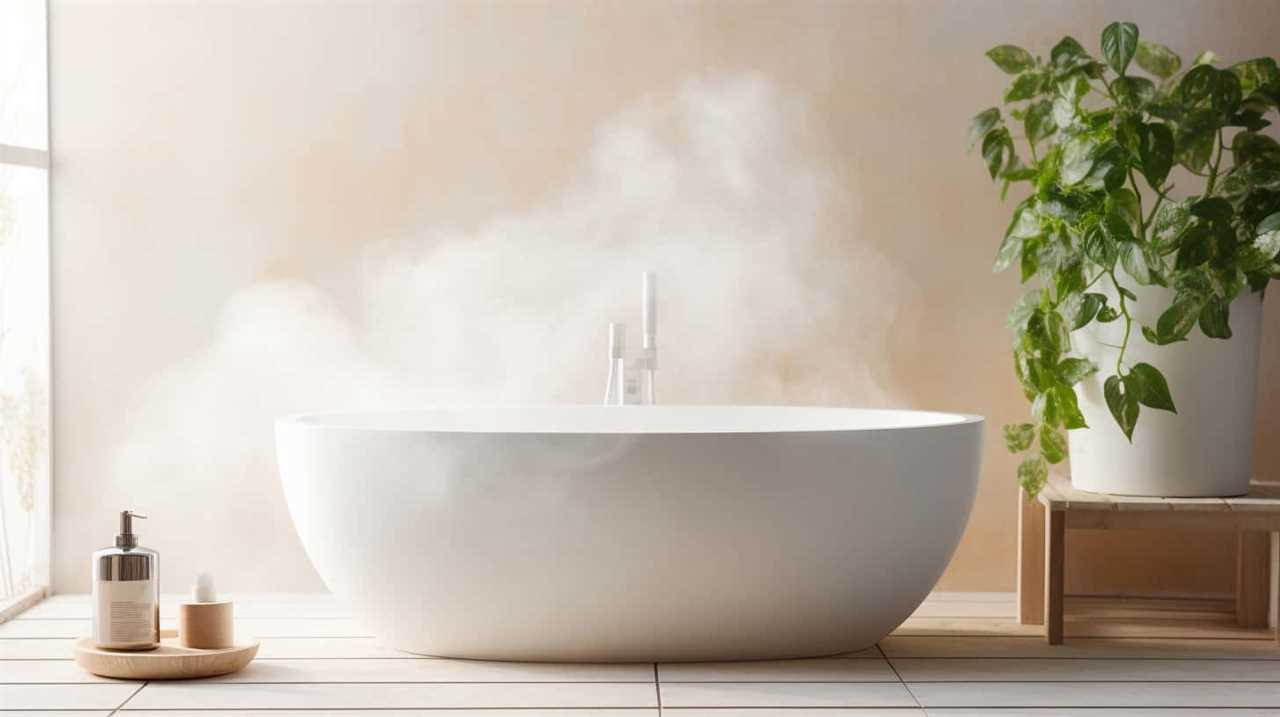Ladies and gentlemen, let’s delve into the enigmatic realm of bathroom ceilings, where an unwanted visitor frequently hides: mold. We will uncover the mysteries surrounding its existence, as knowledge is indeed power.
Excessive moisture, poor ventilation, plumbing leaks, inadequate insulation, and lack of proper cleaning and maintenance are the culprits that pave the way for this unwelcome intruder.
Get ready to wield the tools of understanding as we delve into the intricate web of factors that contribute to mold growth on bathroom ceilings.
Key Takeaways
- Excessive moisture and condensation are major causes of mold growth on bathroom ceilings
- Proper ventilation, such as installing exhaust fans or opening windows, is crucial to control condensation and prevent mold growth
- Plumbing leaks can lead to water damage and create an ideal environment for mold to thrive on bathroom ceilings
- Inadequate insulation allows moisture to accumulate on the ceiling, promoting mold growth
Excessive Moisture
Excessive moisture in bathrooms can be a major cause of mold growth on the ceiling. Controlling condensation and implementing effective waterproofing methods are crucial in preventing this issue.

Condensation occurs when warm, moist air comes into contact with cold surfaces, leading to water droplets forming on the ceiling. To control condensation, proper ventilation is essential. Installing exhaust fans or opening windows during and after hot showers can help remove excess moisture from the air.
Additionally, using waterproof paint or sealants on the ceiling can provide an extra layer of protection against water infiltration. Regularly inspecting and repairing any leaks in plumbing fixtures or pipes can also prevent moisture buildup.
Poor Ventilation
One common factor contributing to mold growth on bathroom ceilings is a lack of proper ventilation. Inadequate air circulation in the bathroom can lead to a buildup of moisture, which creates the ideal conditions for mold to thrive.
To address this issue, it’s important to consider the following ventilation solutions:

- Install an exhaust fan: An exhaust fan can effectively remove humid air from the bathroom, reducing moisture levels and preventing mold growth.
- Open windows: Allowing fresh air to circulate by opening windows can help to improve ventilation and reduce condensation.
- Use a dehumidifier: A dehumidifier can be used to remove excess moisture from the air, maintaining optimal humidity levels and preventing mold growth.
- Clean air vents: Regularly cleaning air vents can help improve airflow and prevent blockages that can impede proper ventilation.
- Consider a bathroom ventilation system: Installing a dedicated bathroom ventilation system can provide constant and efficient airflow, ensuring proper moisture control.
Plumbing Leaks
To continue addressing the factors contributing to mold growth on bathroom ceilings, another common issue is plumbing leaks. Plumbing leaks can lead to water damage, which creates a perfect environment for mold to thrive. Leaks can occur in various parts of the plumbing system, including pipes, faucets, and fixtures. When these leaks go unnoticed or are not repaired promptly, they can cause moisture buildup and eventually result in mold growth on the bathroom ceiling. It is crucial to address plumbing leaks as soon as they are discovered to prevent further water damage and the subsequent growth of mold. Professional repair services should be sought to fix any plumbing issues and mitigate the risk of mold development.
| Plumbing Leaks | Impact |
|---|---|
| Leaky pipes | Water damage, mold growth |
| Leaky faucets | Water waste, mold growth |
| Leaky fixtures | Water damage, mold growth |
| Delayed repair | Increased water damage, persistent mold growth |
Inadequate Insulation
Another factor contributing to mold growth on bathroom ceilings is the lack of proper insulation, which can exacerbate moisture issues. Inadequate insulation can lead to insulation problems and condensation issues, creating an environment ripe for mold growth.
Here are five reasons why inadequate insulation can contribute to mold on bathroom ceilings:
- Insufficient insulation allows warm, moist air from the bathroom to penetrate the ceiling, leading to condensation.
- Without proper insulation, cold air from outside can seep through the ceiling, causing a temperature difference that promotes condensation.
- Inadequate insulation fails to create a thermal barrier, allowing moisture to accumulate on the ceiling.
- Poor insulation can result in heat loss, leading to a cooler bathroom environment and increased condensation.
- Insulation gaps or voids can create pockets where moisture can collect, fostering mold growth.
To prevent mold growth on bathroom ceilings, it’s crucial to address any insulation problems and ensure proper insulation to minimize condensation issues.

Lack of Proper Cleaning and Maintenance
Our lack of proper cleaning and maintenance contributes significantly to the growth of mold on bathroom ceilings. Neglected hygiene and improper sanitation create the perfect breeding ground for mold spores to thrive. Regular cleaning and maintenance are essential to prevent the accumulation of moisture and the growth of mold. Here is a breakdown of the importance of proper cleaning and maintenance:
| Neglected Hygiene | Improper Sanitation |
|---|---|
| Failure to clean bathroom surfaces regularly allows dirt, dust, and organic matter to accumulate, providing nutrients for mold growth. | Inadequate sanitization methods, such as using ineffective cleaning products or not properly disinfecting surfaces, can leave behind mold spores and promote their growth. |
| Lack of proper ventilation and airflow in the bathroom can lead to excess moisture, creating an ideal environment for mold to thrive. | Ignoring leaks, water damage, or plumbing issues can result in continuous moisture exposure, encouraging mold growth. |
| Neglecting to remove excess water, such as after showering or using the sink, contributes to the accumulation of moisture and increases the chances of mold growth. | Failing to address and repair damaged or deteriorating caulking and grout can lead to water seepage and mold growth in the bathroom. |
Frequently Asked Questions
Can Mold on the Bathroom Ceiling Cause Health Problems?
Yes, mold on the bathroom ceiling can cause health problems. Breathing in mold spores can lead to respiratory issues, allergies, and even infections. To prevent this, ensure proper ventilation and regularly clean and maintain your bathroom.
How Quickly Does Mold Typically Grow on a Bathroom Ceiling?
On average, mold can start growing on a bathroom ceiling within 24 to 48 hours. To prevent mold growth, it is important to maintain proper ventilation, control humidity levels, and promptly address any water leaks or damage.
Can Mold on the Bathroom Ceiling Spread to Other Areas of the House?
Mold on the bathroom ceiling can spread to other areas of the house if left untreated. To prevent this, it’s important to regularly clean and maintain the bathroom, ensuring proper ventilation and using effective mold prevention techniques.

Are There Any Natural Remedies to Remove Mold From the Bathroom Ceiling?
There are some natural remedies to remove mold from the bathroom ceiling. We can try using vinegar, hydrogen peroxide, or baking soda. These substances have properties that help in removing and preventing the growth of mold.
What Are the Long-Term Effects of Ignoring Mold on the Bathroom Ceiling?
Ignoring mold on the bathroom ceiling can lead to long-term consequences. Mold can cause respiratory issues and allergies. Regular cleaning and proper ventilation are effective prevention methods to avoid these problems.
Conclusion
So, in conclusion, if you ever find yourself wondering why there’s mold on your bathroom ceiling, just remember the perfect storm of excessive moisture, poor ventilation, plumbing leaks, inadequate insulation, and lack of proper cleaning and maintenance.
It’s like a microscopic art exhibit showcasing the consequences of neglect and ignorance. A surreal masterpiece of dampness and decay, reminding us all to take better care of our bathrooms and prevent the growth of these unsightly and potentially harmful fungi.










